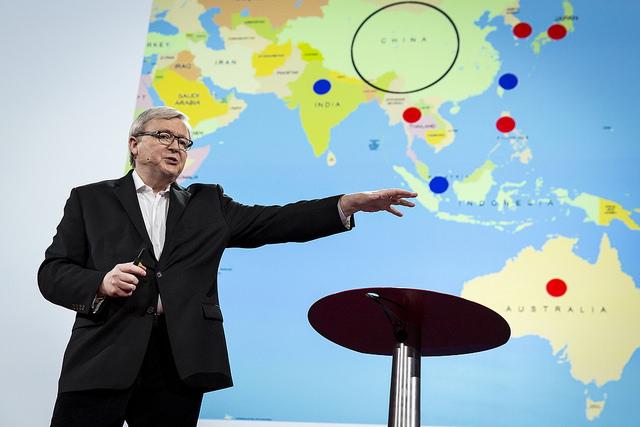
Now everyone’s had their say. Some branded the decision to not nominate Kevin Rudd for UN Secretary General as puerile and pathetic, while others preferred to pretend the decision was simply a ‘difficult’ one on which to make a call. One brave soul has even suggested that Rudd’s bid for power mightn’t be over yet, and that the former PM still has a chance of getting the gig by being nominated by a future President Hillary Clinton.
Personally, I’d suggest that even advancing such a scenario demonstrates a unique detachment from reality. The real point about Rudd’s bid is that the entire affair has occupied far more space in the media than it ever deserved. The best treatment of the entire issue probably came from sketch-writer Tony Wright. A keen observer of the Australian scene, he was far more concerned about chronicling the slow hiss of deflating egos, rather than rushing in to join the queues waiting to either praise or condemn Turnbull’s decision.
The key point about the entire affair is something we in the media far too often lose sight of here in Australia. Rudd was a rank outsider. Even Gareth Evans, one of the former PM’s boosters, admitted as much on The Strategist on Tuesday. Evans suggested Rudd was, ‘at best, a fairly long-shot candidate’. The former Foreign Minister was being far too diplomatic. What he should have said is that Rudd had no chance at all. And that’s really the key to interpreting the entire episode.
For Rudd’s bid to succeed it would have been necessary for everybody to: a) forget the desire to see a woman occupying the position, b) ignore precedent suggesting an East European should get the job, c) suggest Rudd could have overcome a dozen other credible candidates who’ve already put themselves forward for the job, bolstered by the support of their governments, d) brush over the reality that even before the cabinet decision there was far less than unanimous backing for Rudd within Labor, let alone the government and e) dismiss the fact that Rudd had run a dysfunctional office as PM and there has never been any indication that he’s changed his ways.
It beggars belief to even suggest Rudd could ever have been a plausible candidate.
Begin at this point and the discussion within Cabinet decision comes into clearer focus. Some, like Scott Morrison and Peter Dutton, were indeed opposed to Rudd on domestic political grounds, but it would be wrong to insist that Julie Bishop’s proposal didn’t begin from a similar basis.
The DFAT submission wasn’t in the nature of an unqualified backing at all. In fact the just retired head of the department, Peter Varghese, reportedly opposed the decision to nominate Rudd. Try putting on your domestic political hat and Bishop’s case for advancing Rudd’s case looks clear. She knew there was never any real danger of him getting the job but in the future, when it came time to appoint conservatives to plum overseas positions, she could claim she was acting in the national interest. In addition it would make Turnbull appear ‘statesmanlike’.
The trouble is she would never have changed the minds of the Rudd/Labor partisans. They would first have complained that the government didn’t support his bid properly, and then would have found plenty of other reasons to object to other overseas appointments anyway.
Turnbull only encouraged Rudd early on because he genuinely believed his predecessor would realise his tilt was doomed to fail. When Rudd obstinately insisted in pushing ahead, Turnbull told him (months ago) to drop his bid. Any ‘confusion’; any ‘embarrassment’, is entirely due to Rudd’s refusal to listen to repeated warnings and then ignoring them in his one-sided leak of his own pleading letters to the PM.
The question was never, ‘will we back Rudd’, but rather, ’should he have been nominated’. When Rudd asked Australia to endorse his bit, he was also asking us to make a choice. We would have to give up any possible influence we might have had in shaping the contest, simply to endorse his delusion.
His bid has already begun sucking the oxygen from the tilt of another former antipodean Labour PM, Helen Clark, for the job. She had started with a triple advantage over Rudd in that she was a successful woman, (tick) who won three national elections (tick) and is also the current head of the UN Development Program (another tick). None of the Permanent Five have any reason to veto her for personal dysfunction and she was initially seen as having a real chance of success. Her competitors have used every possible reason to diminish her candidacy. Rudd’s undeclared bid, splitting the Pacific support that Clark depended on, hasn’t helped.
Put Clark’s record of achievement up against Rudd’s and it becomes difficult to find any reason to nominate him. Except, of course, the oldest one of all.
Aussie, Aussie, Aussie, Oi, Oi, Oi!
But is it really that important to beat New Zealand?